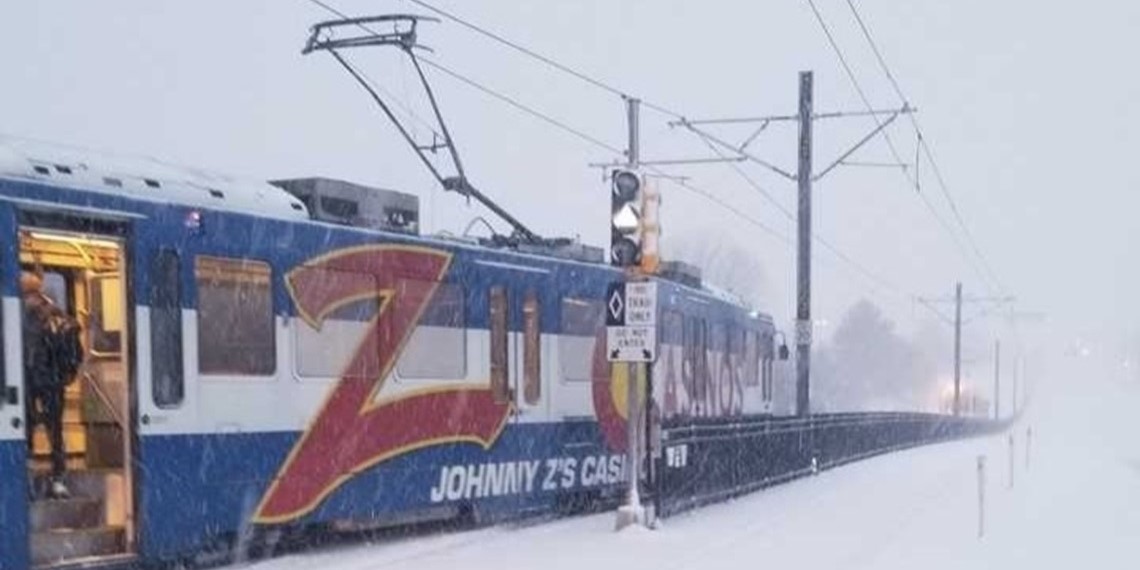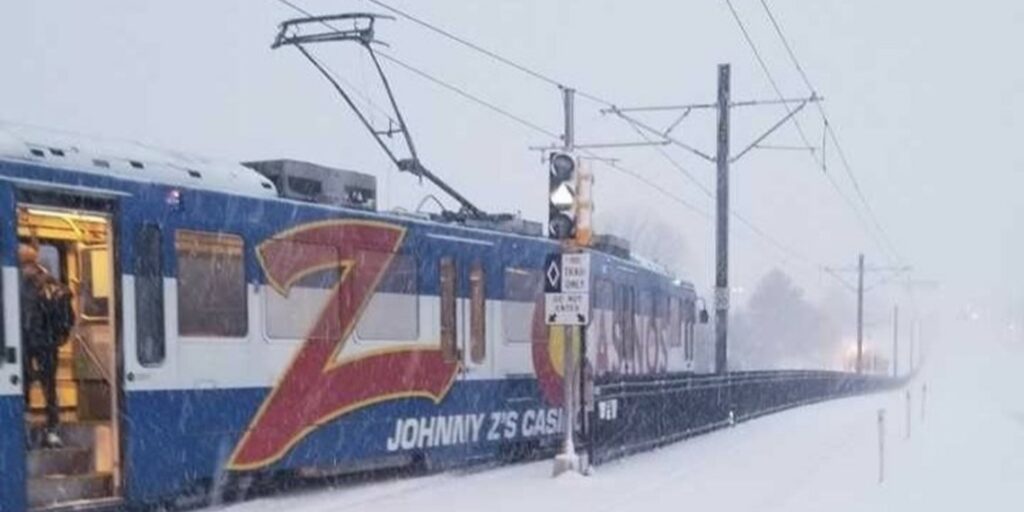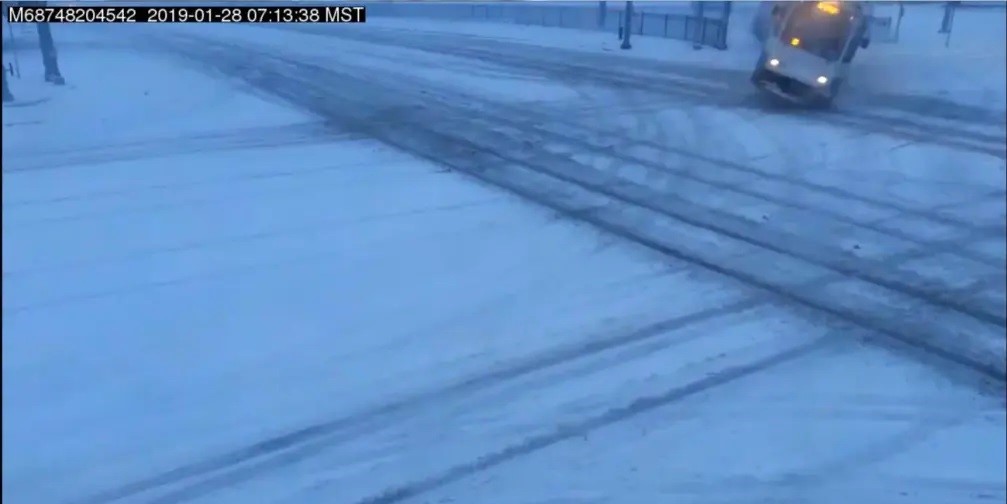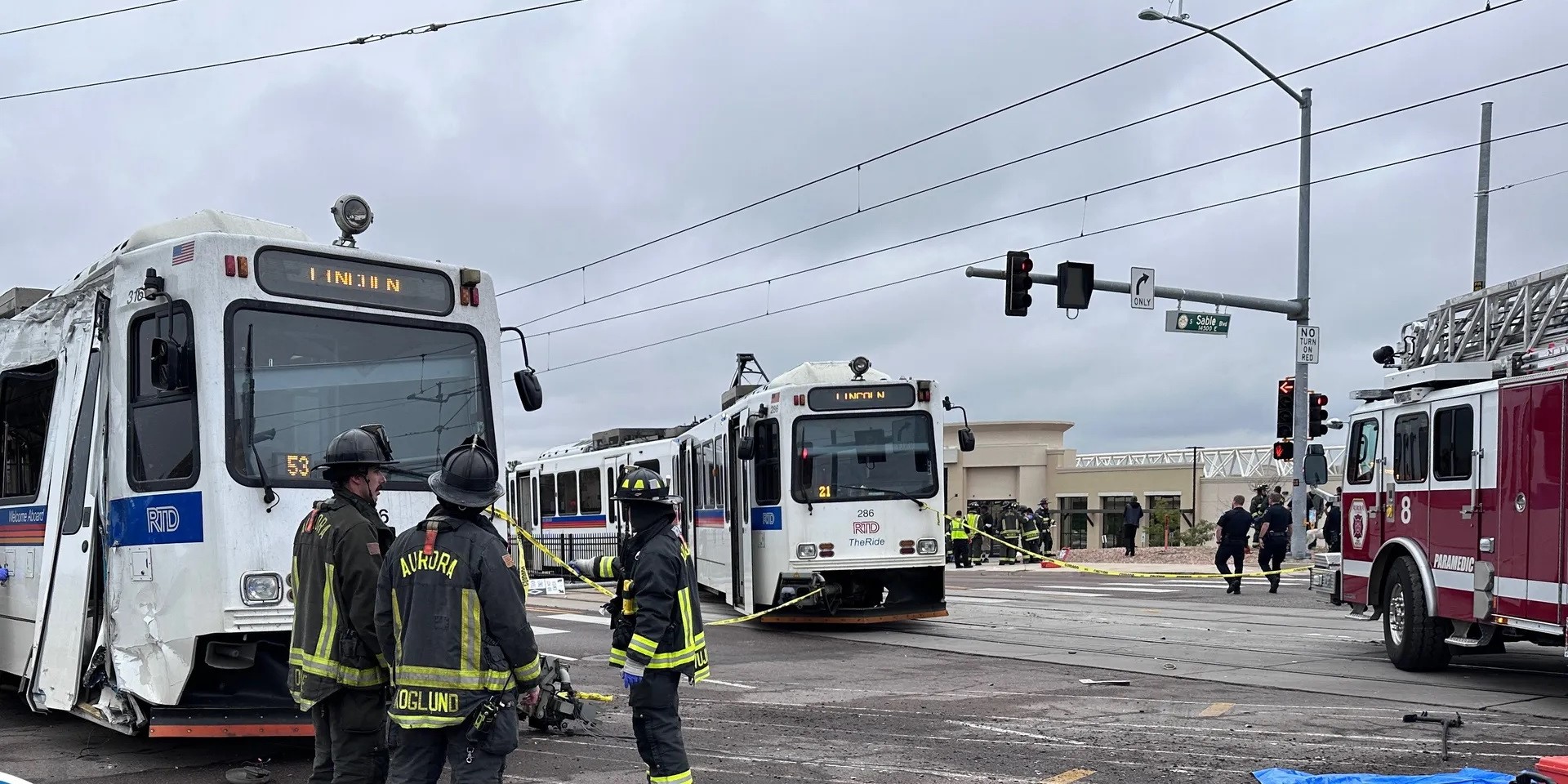
R Line Derailment (2019)
GDT > Features > Light Rail Safety > R Line Derailment (2019)
Incident Description


On January 28th, 2019 at approximately 7:17am, a southbound “R” Line light rail train travelling from Peoria to Lincoln derailed at the junction of East Exposition Ave and South Sable Blvd (between Aurora Metro Center and Florida stations) due to excessive speed. The train consisted of a single Siemens SD-160 light rail vehicle (LRV) #316. The curve has a speed limit of 10 mph (16 km/h) but the train approached at 38 mph (61 km/h). One woman’s foot was amputated by the train wheels after she was ejected from the car during the accident, eight other passengers were also injured. Although determined responsible for the accident, no charges were filed against the operator.
Initial Response
As the incident constituted “A Derailment (Mainline or yard)” under 49 CFR Part 674.33, it was reported by RTD to the Colorado PUC and the Federal Transit Administration (FTA) within two hours of happening.
Train Recovery
The LRV was re-railed on and towed to Mariposa Yard.
Investigation Timeline
Feb 19th, 2019 – Aurora Police Recommend Nine Charges For the Operator
On February 19th, 2019 it was reported that Aurora Police were recommending nine assault related charges to be filed against the operator relating to the injuries sustained by the passengers on the train.
Apr 12th, 2019 – Operator Will Not Face Charges After No Laws Found to Have Been Broken
On April 12th, 2019 it was reported that prosecutors from the 18th Judicial District had declined to file any charges as there was not enough evidence to prove the operator acted recklessly, and Colorado state law excludes train operators from many driving offenses as trains don’t constitute “vehicles” in the same way as cars and trucks do.
Jun 19th, 2019 – Colorado PUC Opens Investigatory Proceedings
On June 19th, 2019, nearly five months after the derailment, the Colorado PUC issued Decision No. C19-0535 which opened investigatory proceedings. The proceeding no. is 19I-0347R.
An accident investigation report, A1-01282019, will remain confidential due to Colorado Revised Statute § 40-18-104.
Jul 18th, 2019 – RTD Submits Corrective Action Plan and Hazard Analysis to the PUC
“It was determined that speed was the single contributor to this event; the track infrastructure and the LRV were in operational condition without defects.”
RTD, May 2019
On July 18th, 2019, RTD submitted it’s Corrective Action Plan (CAP) to the Colorado PUC along with a Hazard Analysis that determined that the cause of the derailment was excess speed. The snowy conditions at the time were not determined to be a major factor in the incident.
RTD’s recommendations were:
- Evaluate current “return to work” policies and procedures for RTD staff authorized to operate trains; a specific focus on employees returning from extended time away.
- Investigate/Assess/Implement Psychological Fitness for Duty (PFFD) policies and procedures under direction of the District’s medical provider for “return to work” programs.
- Develop means and methods for evaluating and tracking all train operators.
- Review and reassess training materials, to include Standard Operating Procedures and Rule Book material; focus to inclement weather operations.
- Confirm current placement and add permitted speed signs in multiple locations to include both Downtown Denver and the R-Line in Aurora, CO.
- Publish a bulletin that is signed for by Operators regarding permitted speed on the alignments and adherence to posted speeds.
- Train Orders shall remind Operators of speed limits on the alignment.
- Implement a Field Supervisor campaign focused on speed adherence; violations of posted speeds triggers face to face meeting with Operator regarding speeding.
The hazard analysis only offers “Human Factors for causation [that are] difficult to manage” as a way to resolve or reduce the hazard of trains entering a curve at excess speed. There is no assessment of whether the systems in place contributed to the incident – in short, everything is blamed on the operator.
There was no discussion of upgrading the Automatic Train Stop (ATS) safety system so it can cut in and stop a speeding train that is about to enter a sharp curve. This would have prevented this incident.
The operator left RTD shortly after the incident.
Aug 6th, 2019 – Colorado PUC Accepts Hazard Analysis but Requires Additional Information for the Corrective Action Plan
On August 6th, 2019, the Colorado PUC issued Decision No. C19-0665 which accepted the Hazard Analysis. However it required RTD to file the following additional information for the CAP including:
- An analysis of the light rail alignment for locations where radar based speed violator strobe signs would be effective and will be installed;
- A report of the analysis performed by RTD of the LRV door design and what, if anything, can be done to mitigate the door failure that occurred during the January 28, 2019 derailment from occurring again under a similar set of circumstances in the future should such circumstances occur;
- Additional information from RTD on any additional information obtained and an analysis performed by RTD on anything else learned from this incident that can be used by RTD going forward to better prepare future operators or analyze operator awareness while they are operating light rail vehicles;
- Additional information from RTD on any issues they are having with obtaining and retaining operators and/or how the limited numbers of operators may be creating or leading to issues that may have led to or contributed to the derailment.
Sep 16th, 2019 – RTD Submits Additional Information for the Corrective Action Plan
“RTD has added additional permitted speed signs in multiple locations in Downtown Denver and on the R-Line in Aurora.”
RTD, September 2019
On September 16th, 2019, RTD submitted it’s additions to the Corrective Action Plan to the Colorado PUC. The main points were:
- RTD has added speed restrictions signs to other parts of the the R Line and wider light rail system that have low speed curves inlcuding the “radar based speed violator strobe” type.
- A detailed report from LRV door manufacturer Innovations for Entrance (IFE) was included. The submission detailed the hurdles Siemens Mobility (the LRV manufacturer) was having due to Colorado Revised Statute § 40-18-104 in being able to fulfil RTD’s request to supply information as confidential information was first required from the accident investigation.
- RTD has increased operator train and examination requirements including those for operators who have had a “prolonged absence” from work.
- RTD supplied information about its operator shortage, which was typically being short 12-15 operators a day meaning other operators were routinely working 6 days a week to make up for the shortfall.
Oct 11, 2019 – Colorado PUC Approves Corrective Action Plan But Asks for More Documents
On October 11th, 2019, the Colorado PUC issued Decision No. C19-0829 which accepted the Corrective Action Plan (CAP). However it required RTD to file the following further documents including:
- A document after analysis of the car shell and door interaction has been completed by RTD’s contractors (Siemens Mobility, the LRV manufacturer).
- A document after RTD completes its analysis of staffing issues and possible mitigation.
- Documents that track the progress of implementing the mitigation measures outlined in the CAP.
- A full analysis of its budget issues regarding “adding technological mitigation to its light rail system” and provide the Commission with a plan of how RTD proposes to move forward with enhancing its system and operations with additional technologies by April 30, 2020.
As can be seen by the last request, the Colorado PUC is beginning to grasp the fact that this accident was not all about “human factors” and modifications to the safety systems should be considered.
Oct 31st, 2019 – RTD Submits a Notice of Revised Timeline
On October 31st, 2019, RTD submitted a Notice of Revised Timeline to the Colorado PUC stating it intended to submit documentation relating to the analysis of its light rail operator mandating history, hiring, retention and absences no later than November 30th, 2019.
Dec 2nd, 2019 – RTD Submits a Report of Revised Timeline
On December 2nd, 2019, RTD submitted a Report of Revised Timeline (in effect a second notice – see above) to the Colorado PUC stating it intended to submit documentation relating to the analysis of its light rail operator mandating history, hiring, retention and absences plus the analysis of the car shell and door interaction no later than January 15th, 2020.
Jan 15th, 2020 – RTD Submits Analysis of Operator Mandating History, Hiring, Retention and Absences
“Operators state mandating as their number one complaint and in asking how it has impacted them they said: tired / exhausted (78%), affected relationships at home (70%), health is worse (70%), schedules unrealistic (83%), schedules have impacted safe operations (80%), leadership is not engaged (70%).”
RTD, January 2020
On January 15th, 2020, RTD submitted its analysis of its light rail operator mandating history, hiring, retention and absences to the Colorado PUC. The main points were:
- A Work Force and Operator Mandating document was submitted as Attachment 1.
- A Proposed Service Reduction Plan to Address Operator Shortage document was submitted as Attachment 2.
- The analysis of the car shell and door interaction is now expected no later than February 15th, 2020.
Feb 14th, 2020 – RTD Submits Car and Door Analysis Plus Updated Reports
“The highly unusual forces on the vehicle, as a result of the impact, exceeded the design specifications damaging the door leaf lower guiding rail allowing the door rollers to lift from the guide.”
RTD, February 2020
On February 14th, 2020, RTD submitted it’s car and door analysis plus updated reports Colorado PUC. The main points were:
- The Siemens Car Shell and Door Analysis document was submitted as Attachment 1.
- A revised analysis report from LRV door manufacturer Innovations for Entrance (IFE) as Attachment 2.
- An Executive Summary of the car and door reports by RTD was submitted as Attachment 3.
May 26th, 2020 – RTD Asks for an Extension of Time to Submit the Budget Issues Analysis
“RTD has been deeply involved with the unprecedented demands of Covid 19 crisis management for its mass transit system since March of this year. Additionally, amendments to the RTD budget made necessary by serious Covid 19 financial impacts are not yet finalized.”
RTD, May 2020
On May 26th, 2020, citing the Covid-19 pandemic, RTD filed a motion with the Colorado PUC for an extension of time to August 31st, 2020 to submit the Budget Issues Analysis. This was granted by the PUC with Decision No. C20-0417 on June 4th, 2020.
Aug 28th, 2020 – RTD Asks for a Second Extension of Time to Submit the Budget Issues Analysis
“Due to the projected shortfall, RTD must make severe cuts from current, already reduced expenditures in order to produce a balanced 2021 budget. The nature of the cuts, and the final 2021 budget will not be approved by the RTD Board of Directors until December, 2020. RTD now believes it cannot meaningfully evaluate its options and present a proposed enhancement plan before the 2021 budget is approved.”
RTD, August 2020
On Aug 28th, 2020, RTD filed a motion with the Colorado PUC for a second extension of time to January 31st, 2021 to submit the Budget Issues Analysis. This was granted by the PUC with Decision No. C20-0657 on September 11th, 2020.
Jan 29th, 2021 – RTD Submits its Budget Issues Analysis
“RTD wishes to be prepared for increased future availability of funding for capital projects, including a project for technological enhancement of light rail system signal enforcement and speed control. To that end, RTD will engage consultant services in 2021 to perform an analysis of functionality, availability and cost of Enhanced Automatic Train Control systems such as the Metrom system, or similar sustainable technology.”
RTD, January 2021
On January 29th, 2021, RTD finally submitted its Budget Issues Analysis to the Colorado PUC. While the document paints a pretty bleak picture regarding the availability of funding for capital projects (mostly due to the Covid-19 pandemic), there is welcome news that the agency plans to study the safety system improvements which most likely would prevent a repeat of this derailment.
Feb 3rd, 2021 – Colorado PUC Accepts RTD’s Budget Issues Analysis and Closes CAP
On February 3rd, 2021, the Colorado PUC accepted RTD’s analysis of its budget issues regarding adding technological mitigation to its light rail system and closed the CAP.
Sep 21st, 2022 – A Second Derailment Occurs at the Same Location

Sadly, despite the safety conversation finally going the right way and RTD planning to bring on a consultant to study safety enhancements, time runs out as just over 18 months later on September 21st, 2022, a second derailment happens at the same location.
Our View…
Greater Denver Transit finds it regretful that this incident investigation and approval process initially arrived at unsatisfactory conclusions.
- There is no explanation as to why the operator drove the train at excess speed into the curve.
- There is no discussion of upgrading the Automatic Train Stop (ATS) safety system so it can cut in and stop a speeding train that is about to enter a speed restricted curve. This would have prevented this incident.
- The operator appears to have been mainly blamed for the accident, rather than the systems in place.
- The investigation established a clear link between operator working conditions and safety performance.
- The legislation requiring accident investigations to be sealed inhibited the progress of the investigation as it required RTD to get permission to release information to its contractors and said contractors to sign non-disclosure agreements (NDAs).
- The Colorado PUC made use of a good opportunity to require investigation of how the LRV doors performed in the accident, despite this not being related to the primary cause.
- The discussion on technological enhancements to the light rail system appears to be dominated primarily by financial considerations and not safety. This was made worse by the Covid-19 pandemic delaying the 2021 budget.
- The way this incident was investigated shows why Accident Investigation Reform is needed.